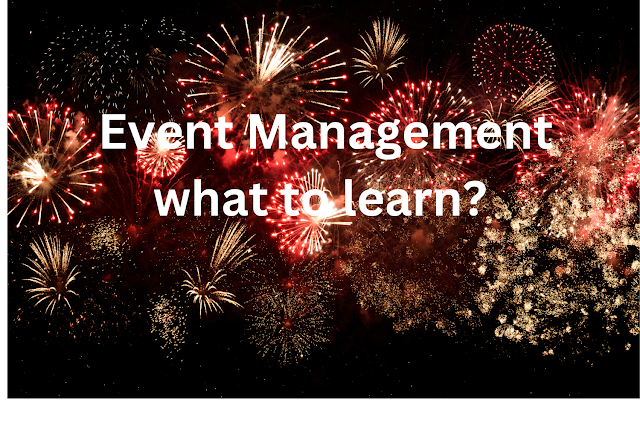Event Management
Introduction
In the world of social gatherings, corporate meetings and grand celebrations, the organization of events requires great planning and execution. This process is known as event management, a profession that demands a diverse set of skills and a keen eye for detail. This article discusses the essence of event management, exploring the top skills required, educational pathways, the expansive scope of the field, and a glance at the top event management companies in Pakistan.
Understanding Event Management
At its core, event management involves the art and science of planning, organizing, and executing events of various scales and purposes. From intimate weddings and corporate conferences to large-scale concerts and community festivals, event managers serve as the architects behind the scenes, ensuring that every element aligns seamlessly to create memorable experiences.
Virtual Event Management
Virtual event management involves planning, organizing, and executing events that take place entirely online. These events can range from webinars and virtual conferences to trade shows and online product launches. Here are some key aspects and differences compared to traditional, in-person event management:
Pros of Virtual Event Management
Global Reach
Cost Savings
Data and Analytics:
Flexibility
Reduced Environmental Impact
Cons of Virtual Event Management:
Technology Challenges:
Networking Challenges:
Engagement Issues:
Limited Physical Interaction:
Security Concerns:
Difference between Virtual and In-Person Event Management:
Physical Presence:
In-person events require attendees to be physically present at a designated location, while virtual events take place online.
Logistics:
Virtual events eliminate the need for venue bookings, transportation logistics, and accommodation arrangements associated with in-person events.
Networking Dynamics:
In-person events allow for spontaneous and organic networking, while virtual events often require dedicated networking features and tools.
Engagement Opportunities:
In-person events offer face-to-face interactions, hands-on experiences, and immersive environments, which can be challenging to replicate virtually.
Cost Structure:
The cost structure differs significantly, with virtual events often having lower overhead costs but potentially requiring investments in virtual platforms and technologies.
Ultimately, the choice between virtual and in-person event management depends on the nature of the event, target audience, objectives, and prevailing circumstances, such as global events impacting travel and public gatherings. Hybrid events, combining elements of both, have also become popular to leverage the advantages of both formats.
Hybrid Event Management
Hybrid event management combines elements of both in-person and virtual events, offering participants the flexibility to attend either physically or online. This approach aims to provide a seamless and integrated experience for both virtual and on-site attendees. Here's an overview of hybrid event management and its differences from traditional and virtual event management:
Differences from In-Person Event Management
Dual Experience:
Hybrid events cater to both physical attendees and virtual participants, requiring considerations for engagement in both environments.
Technology Integration:
Hybrid events leverage technology to connect virtual and in-person audiences, including live streaming, virtual booths, and interactive online features.
Content Delivery:
Content delivery methods may differ, with in-person sessions and activities complemented by virtual content accessible to online participants.
Differences from Virtual Event Management
Physical Component:
Hybrid events include a physical component with an on-site presence, allowing for face-to-face interactions.
Logistics:
Hybrid events involve logistics for both in-person and virtual aspects, such as venue arrangements and virtual platform management.
Engagement Strategies:
Engagement strategies need to address both virtual and in-person audiences, combining methods suitable for each context.
Pros of Hybrid Event Management:
Increased Reach:
Hybrid events extend the reach to a broader audience, accommodating those who cannot attend physically.
Flexibility:
Participants can choose their preferred mode of attendance, providing flexibility for diverse needs and circumstances.
Cost Optimization:
While there are still costs associated with physical components, hybrid events can be more cost-effective than fully in-person events.
Data Analytics:
Like virtual events, hybrid events can leverage data analytics for insights into attendee behavior and preferences.
Risk Mitigation:
Hybrid events provide a degree of risk mitigation by offering a virtual option in case of unforeseen circumstances affecting in-person attendance.
Cons of Hybrid Event Management:
Increased Complexity:
Managing both physical and virtual components adds complexity to event planning and execution.
Technical Challenges:
Hybrid events may face technical challenges, such as ensuring a seamless experience for both virtual and in-person participants.
Resource Requirements:
Organizing hybrid events requires additional resources, including technology, staff, and potentially multiple venues.
Engagement Balance:
Striking the right balance in engagement strategies for both virtual and in-person audiences can be challenging.
Potential for Inequality:
There's a risk of creating a divide between in-person and virtual attendees, with differences in the quality of experience.
Hybrid event management seeks to combine the best of both worlds, offering the advantages of in-person interactions and the reach of virtual events. Careful planning and execution are crucial to successfully navigate the unique challenges posed by this format.
Understanding Event Planning
Event planning is a multifaceted process that involves orchestrating various elements to create a seamless and successful event. It is a meticulous journey that begins with the conceptualization of the event's purpose, theme, and goals. The planner is tasked with translating these conceptual ideas into actionable plans, setting the stage for what will unfold during the event.
Key Aspects of Event Planning:
Conceptualization:
This marks the initiation of the planning process. Defining the event's purpose, target audience, and overarching theme are critical aspects.
Here, planners brainstorm ideas, create a vision, and establish the foundation upon which the entire event will be built.
Budgeting:
Allocating financial resources to various components, such as venue selection, catering, entertainment, and decorations.
Effective budgeting ensures that the event aligns with financial constraints while still meeting the desired standards.
Logistics:
Planning for practicalities such as transportation, accommodation, and infrastructure requirements.
Detailed logistics guarantee that the event environment is conducive to its objectives.
Scheduling:
Creating a comprehensive timeline that spans from the initial planning stages to the conclusion of the event.
A well-structured schedule helps in coordinating activities and ensuring a smooth flow of events.
Coordination:
Coordinating various elements and stakeholders involved in the event, from vendors to speakers and attendees.
This involves effective communication and collaboration to avoid hiccups during the planning and execution phases.
Linking Event Planning with Event Management:
While event planning lays the groundwork, event management takes the process a step further, encompassing the entire lifecycle of an event.
Event Planning Focus:
Event planning predominantly concerns itself with the pre-event aspects, including conceptualization, strategizing, and detailed planning.
During this phase, planners are immersed in creating the blueprint for the event.
Event Management Encompasses:
Event management covers a broader spectrum, extending from planning to execution and post-event evaluation.
As the event date approaches, planners transition into managers, overseeing the implementation of pre-established plans.
Seamless Transition:
The transition from planning to management is seamless, with planners assuming a hands-on role during the event.
Event managers are on-site, ensuring that the intricately crafted plans are executed flawlessly.
Top 10 Event Management Skills
1. Organizational Skills
Arguably the cornerstone of successful event management, organizational skills are crucial for orchestrating multiple aspects of an event. From coordinating vendors to managing logistics and schedules, event managers need to create a harmonious symphony out of various moving parts.
2. Communication Skills
Effective communication is the glue that holds the entire event management process together. Event managers must communicate clearly with clients to understand their visions, collaborate with vendors to secure services, and lead a team to execute tasks seamlessly. Strong interpersonal skills are essential for navigating the diverse array of stakeholders involved in any event.
3. Problem-Solving
Events rarely unfold without a hitch, and the ability to think on one's feet is a prized skill in event management. Whether it's a sudden change in weather, a logistical hiccup, or an unforeseen challenge, event managers must navigate these issues swiftly and decisively to ensure the event's success.
4. Attention to Detail
Precision is paramount in event management. Overlooking even the smallest detail can have cascading effects on the overall experience. From the choice of flowers on the tables to the timing of speakers during a conference, every detail contributes to the success of the event.
5. Creativity
In a world saturated with events, creativity sets exceptional ones apart. Event managers must bring innovative ideas to the table, offering fresh and engaging experiences for attendees. Whether it's thematic decor, unique entertainment, or interactive elements, creativity is the spark that ignites memorable events.
6. Flexibility
Adaptability is a must in event management. Plans may change, unexpected issues may arise, and being able to pivot seamlessly is a hallmark of a skilled event manager. Flexibility allows for the smooth handling of unforeseen circumstances, ensuring that the event stays on track.
7. Negotiation Skills
Event managers often act as mediators between clients and vendors, and having strong negotiation skills is vital. Securing the best deals on venues, catering, and other services can significantly impact the overall budget and success of the event.
8. Team Management
Events are collaborative endeavors that require effective teamwork. Event managers must lead and coordinate diverse teams, including planners, vendors, and support staff. Leadership skills, delegation, and fostering a positive team dynamic contribute to a cohesive and efficient event execution.
9. Budgeting
Financial acumen is crucial in event management. Creating and managing budgets ensures that resources are allocated efficiently, maximizing the impact of every dollar spent. Event managers must balance the client's vision with financial constraints to deliver a successful event.
10. Networking
Building and maintaining relationships within the industry are key to long-term success in event management. Networking opens doors to new opportunities, partnerships, and collaborations. A well-connected event manager can tap into a vast pool of resources, from reliable vendors to potential clients.
Education Requirements
While there is no one-size-fits-all educational path for aspiring event managers, a solid foundation in relevant fields can significantly enhance one's capabilities. Many successful event managers hold degrees in MBA marketing or business. However, the dynamic nature of the field places high value on practical experience gained through internships, on-the-job learning, and involvement in event-related projects.
The Expansive Scope of Event Management
The scope of event management is vast and continually evolving. As society places increasing importance on experiences, events play a pivotal role in shaping memories and leaving lasting impressions. Event managers can specialize in various niches, including:
Corporate Events:
Conferences, product launches, and team-building events.
Weddings and Social Events:
Creating unforgettable moments for couples and families.
Concerts and Entertainment Events:
Managing logistics for large-scale performances.
Sports Events:
Coordinating everything from logistics to fan engagement.
Community and Cultural Festivals:
Organizing events that celebrate diversity and community spirit.
The demand for skilled event managers spans industries, making it a versatile and dynamic career choice. The ability to specialize in different niches allows professionals to tailor their expertise to specific areas of interest.
Top Event Management Companies in Pakistan
Pakistan's event management landscape has seen significant growth, with numerous companies showcasing their expertise in delivering exceptional events. Here's a glimpse of some of the top event management companies in the country:
Catwalk Events:
Renowned for its expertise in fashion and entertainment events, Catwalk Events has left an indelible mark on the industry.
J&S Events:
With a diverse portfolio, J&S Events is known for its creativity and seamless execution across weddings, corporate events, and social gatherings.
QYT Events:
Specializing in corporate events and conferences, QYT Events is recognized for its professional approach and attention to detail.
Tulips Event Management:
This company has made a name for itself in the wedding and social events sector, offering personalized and memorable experiences.
Empire Group of Event Management:
With a broad spectrum of services, Empire Group is a prominent player in the event management scene, catering to diverse client needs.
Epic Events:
True to its name, Epic Events is known for crafting extraordinary experiences, whether it's a high-profile corporate gathering or a cultural festival.
Walnut Events:
Walnut Events stands out for its innovative approach and commitment to delivering events that captivate audiences.
Innovators Events:
This company lives up to its name by constantly pushing the boundaries of event management, introducing innovative concepts and experiences.
Pearl Continental Hotels & Resorts:
While primarily a hospitality giant, Pearl Continental is recognized for its excellence in hosting and managing corporate events within its luxurious venues.
Dreamworld Resort, Hotel & Golf Course:
Offering a blend of hospitality and event management, Dreamworld is a prominent player in the industry, hosting a variety of events in its expansive facilities.
These companies have earned their positions through a combination of expertise, innovation, and successful event executions. Whether it's a lavish wedding, a corporate seminar, or a community festival, these event management companies contribute significantly to the vibrant events scene in Pakistan.
Use of Technology and Software for Event Management
Eventbrite:
Key Features:
Online event registration, ticketing, promotion, and attendee management.
Strengths:
User-friendly interface, wide range of customization options, and integrated payment processing.
Use Case:
Suitable for a variety of events, from small local gatherings to large conferences.
Cvent:
Key Features:
Event registration, website building, email marketing, and attendee tracking.
Strengths:
Comprehensive suite of tools for planning and managing events of all sizes, from small meetings to large conventions.
Use Case:
Ideal for organizations hosting complex events with multiple sessions, speakers, and sponsors.
Bizzabo:
Key Features:
Event website creation, registration, networking tools, and analytics.
Strengths:
Emphasis on creating engaging and interactive event experiences, with features like agenda personalization and in-app messaging.
Use Case:
Suited for events where fostering networking and attendee engagement is a priority.
Regpack:
Key Features:
Registration management, payment processing, and customizable forms.
Strengths:
Particularly useful for events with complex registration requirements and varying pricing structures.
Use Case:
Beneficial for conferences, camps, and other events with unique registration needs.
Hubb:
Key Features:
Content management, speaker management, and attendee engagement tools.
Strengths:
Focuses on enhancing the overall event experience with features like real-time polls, surveys, and collaborative agenda building.
Use Case:
Suitable for conferences and events where content and attendee interaction are crucial.
Remember to evaluate these options based on your specific event requirements, budget constraints, and the user experience you aim to provide for attendees and organizers. Additionally, check for any updates or new features that may have been introduced since my last training cut-off in January 2022.
Conclusion
Event management is a multifaceted profession that requires a blend of creativity, organizational prowess, and interpersonal skills. As the demand for memorable experiences continues to rise, the field presents exciting opportunities for individuals with a passion for orchestrating seamless and unforgettable events. Whether pursuing formal education in event management or gaining practical experience on the job, aspiring event managers have a dynamic and rewarding career path ahead. In Pakistan, the top event management companies are not just organizers; they are architects of experiences, shaping the cultural







